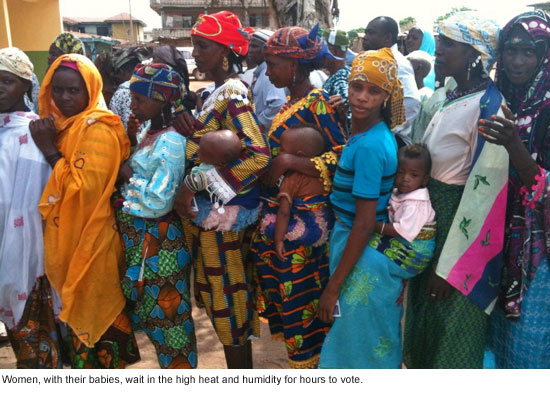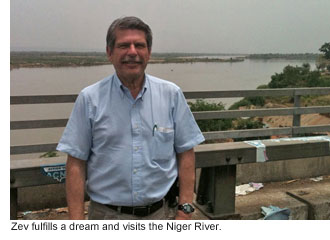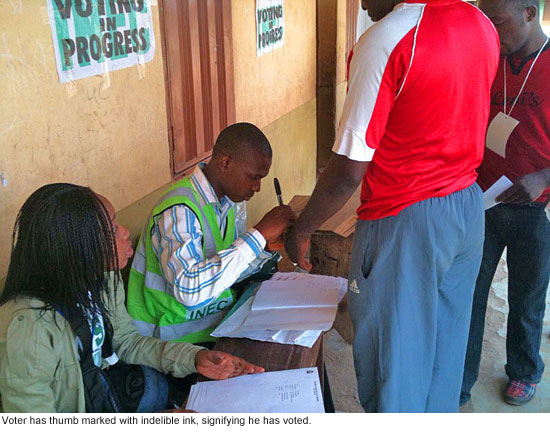Dispatches from a democracy in progress
April 11, 2011
 Election day, Saturday, started ominously. The night before, a terrorist bomb exploded in the city of Suleja, 12 miles from the nation’s capital, Abuja. At least 13 people were killed. There were several other incidents Friday night that were obviously designed to disrupt the election. It didn’t work.
Election day, Saturday, started ominously. The night before, a terrorist bomb exploded in the city of Suleja, 12 miles from the nation’s capital, Abuja. At least 13 people were killed. There were several other incidents Friday night that were obviously designed to disrupt the election. It didn’t work.
The election appeared to be an improvement over previous national elections here. To be sure, there were problems. It took hours in the a.m. for people to check in, and then several more hours in the p.m. for voters to cast their ballots. All voting was outdoors, and it was hot and humid. I was wiped out, and I had an air conditioned car to which to escape. I can’t imagine what women with babies on their backs were going through, standing for hours at a time. These waits created some episodic tension.
Other problems our delegation witnessed included under age voting, missing names on voter registration rolls, late opening of many polling sites, inconsistency in the posting of the results at polling stations, inconsistency in the application of election laws and rules, and a lack of prioritization for the elderly, disabled and pregnant women or other women who brought their youngsters to voting stations. All these concerns were addressed in a preliminary report released by our NDI delegation.
Nevertheless, we thought that Nigeria took a positive and necessary step toward the building of a sustainable democracy and strong democratic institutions. Voters came by the hundreds to each polling station, determined to make this election work. Many hung around all day in the oppressive weather and into the dark evening to observe the vote count.
An especially moving part of election day came at the end, when ballots were tabulated at polling stations. We chose one at random to monitor in the central part of Ilorin, the capital of Kwara state, where we were deployed. A crowd of nearly 100 partisans of various parties gathered to observe the count at this precinct, a scene repeated at thousands of polling places around the country.
 Afer each ballot was retrieved from the ballot box, the precinct officer would show it to the assembled crowd and announce the chosen candidate. Cheers would arise from the partisans in the crowd. When the vote’s final result was announced, the winning side not only cheered but started dancing in the street. It was an exhilarating end to a very long day. The results were then posted (at our polling station, at least), and the ballots were transported to the election commission headquarters for the official election report.
Afer each ballot was retrieved from the ballot box, the precinct officer would show it to the assembled crowd and announce the chosen candidate. Cheers would arise from the partisans in the crowd. When the vote’s final result was announced, the winning side not only cheered but started dancing in the street. It was an exhilarating end to a very long day. The results were then posted (at our polling station, at least), and the ballots were transported to the election commission headquarters for the official election report.
As we concluded our election day activities, I asked my observation partner, Jennifer Cooke, director of the Africa program for the Center for Strategic and International Studies, what are the American national security interests in Africa. She said that the three principal interests are:
1. Corrupt regimes and/or political instability are fertile breeding grounds for extreme ideologies and movements that manifest themselves in ways that are inimical to our interests.
2. Energy. Nearly 25% of our imported oil now comes from Africa, 9% of it from Nigeria itself. Political stability is, therefore, in our best interest. Instability can cause the price of energy to fluctuate and supplies to diminish. And energy uncertainty has its own national security issues for us.
3. In the increasingly globalized nature of our economy and other national policies, we will increasingly depend on coalitions with and support of the many nations on this African continent to join with us in various international forums as we address issues such as trade and terrorism.
Simply put, Nigeria is the biggest nation on the African continent. Any failures there could easily spread to the rest of West Africa and beyond. This would not be good for them or for us. To paraphrase the late German statesman Klemens von Metternich, if Nigeria sneezes, the rest of Africa could well catch a cold.
So our election monitoring delegation leaves Nigeria tonight with the satisfaction that this country got a lot right in its election, but tempered by the reality that it has a long way to go.
On a personal note, I did get my chance to see the Niger River today, a body of water that has intrigued me since my days as a graduate student at UCLA in British Imperial history. We drove back to Abuja, an eight hour drive of 300 miles. The roads are, to be blunt, horrible—two lanes all the way, with missing chunks of road every now and then that makes driving them time consuming and dangerous. Overturned trucks, including huge gasoline trucks, abound along the roadsides, crashed and abandoned by their drivers. As one local described it: ”Driving in Nigeria is a competition among drivers. Some win, and some don’t.”
About six hours into the drive we approached the bridge over the Niger. I asked our driver to stop so I could take a closer look and give me and the river a chance for our photo op. I never thought I’d have this chance, and yet here I was.
To those of you who have been following my blogs from Nigeria, thank you. I’ve enjoyed sharing this experience—both the policy and personal sides. As I prepare for my 22 hour trip home, I confess that I’ll be sorry to leave. The people have been wonderful, and I won’t soon forget their courage and resilience. I wish them well on their march toward sustainable democracy, a march that all of us should support, not only because it’s in our best interests, but because it’s right.
Photos from Zev Yaroslavsky
Posted 4/11/11














 405 bridge work causes a stink
405 bridge work causes a stink





